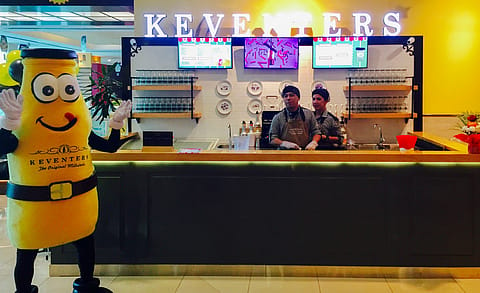100-yr old Keventers to take milkshake to small cities
Iconic milkshake brand plans to open 50-100 cafes across Tier II, III and IV cities over the next three-four years.

To get consumers spend more time at its stores, iconic milkshake brand Keventers plans to open 50-100 cafes, or ‘experiential stores’, over 600-800 sq.ft. in small- and mid-sized cities over the next three-four years. The stores will also have a varied menu offering a broader choice of savoury and food items, besides the regular milkshakes and desserts.
While consumers in metros are typically spoilt for choice — there is no dearth of cafes, restaurants and other related commercial establishments — those in smaller cities are, however, starved of options, providing ample opportunity for brands to widen their user base and add to revenues. Also, the QSR [quick-service restaurants] format largely caters to the ‘pick and go’ culture of fast-paced metros. The chain of petite QSR outlets that the iconic milkshake brand has traditionally been identified with, may not be enticing enough to keep customers engaged for long hours.
“We have realised that people in Tier II, III and IV cities want more options. They want to experience formats such as cafes and experiential stores. We want to give consumers more reasons to come to Keventers. And this is one way of looking at it,” says director and co-founder Agastya Dalmia, describing Keventers as a “100-year-old start-up.”
The company history dates back to 1925 when Swedish native Edward Keventer moved to the Indian capital and set in motion the process of setting up a dairy manufacturing plant in New Delhi’s Chanakyapuri, building on his earlier entrepreneurial successes of turning around ailing dairy businesses in the country. In 1940, Dalmia’s family took over the Keventers business, which eventually became dormant in the 1980s, but was only present through a few unauthorised outlets. In 2015, college friends Dalmia and now co-founder, director and CMO Aman Arora, decided to rebuild the brand. They transformed the company into an established retail brand with storefronts; the old Keventers was into manufacturing of products which were then distributed to various stores across cities. “We only inherited the brand name and a few milkshake recipes. But everything else — the concept of Keventers store, building 100-sq.-ft. outlets was completely new for us. We introduced many new milkshakes flavours to cater to the evolving consumer taste and keep up with the competition,” says Dalmia.
Having been able to deftly refurbish the brand and then navigate a once-in-a-generation pandemic, Keventers is crafting more post-pandemic strategies. It is also gearing up to go D2C (direct-to-consumer); this plan fits in well with the brand’s aggressive push to expand into smaller cities. Its website, currently in the pilot stage (and serving only New Delhi and some parts of Mumbai), will go live across all locations in January. The D2C model helps brands establish a direct connect with customers and interact with them better, thereby enabling them to gather customer feedback and work on product innovation accordingly. “D2C is good for customer retention and information, which is valuable today,” says Dalmia. Besides, Keventers can also leverage the D2C model to directly promote its ice cream brand ‘Ice Creamery’, launched in 2018. The company aims to build a selection of 10-12 ice-cream flavours from the current six. “Ice cream has been phenomenal for us ever since we made a packaging change. Our USP is that the flavours are rich and indulgent,” says Dalmia.
Business for Keventers has already surpassed the pre-pandemic levels, claims Dalmia. The brand garners sales of around ₹5-7 lakh per month per store on an average from its 170 QSR stores across more than 40 cities.
The company also plans to widen the network of Cloud kitchens to around 100 within the next five years from the current 30-35. The idea is to open such delivery only kitchens in areas that are financially not very viable in terms of opening stores. Dalmia says the brand spends around Rs 30 lakh to open a store. “Cloud kitchens can be made at 20-25% of the cost of opening traditional stores. That makes the expansion much faster, easier and risk-free,” says Dalmia.